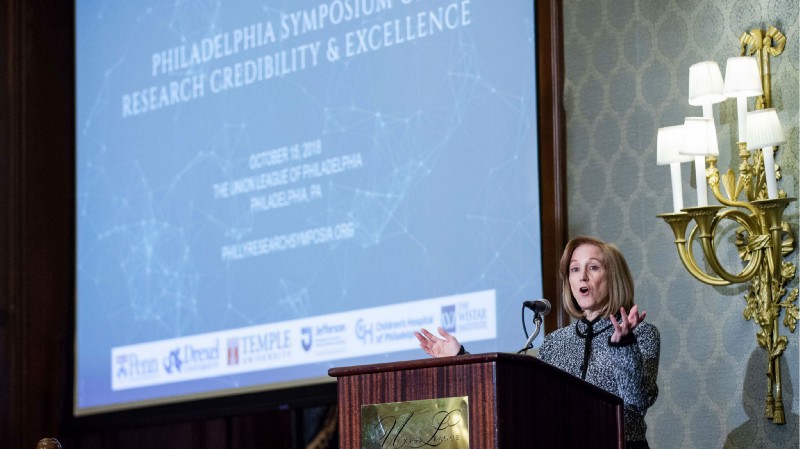Promoting Innovative, Reproducible Science: Penn’s Research Excellence Initiative
The two-year effort includes electronic research notebooks, a research symposium, and a task force of faculty and students, all spearheaded by the Office of the Vice Provost for Research.

In a grand hall in a 150-year-old historic building in Center City, the Philadelphia research community gathered to generate ideas and make connections. Their aim: to discuss ways to attain the common goal of innovative, trustworthy, reproducible science, particularly at a time when the very idea of such pursuit has come under fire.
“Scientific research has been the cornerstone of modern society,” said Dawn Bonnell, Penn’s vice provost for research, in introductory remarks at the Philadelphia Symposium on Research Credibility & Excellence. But “innovation is not manna from heaven. It’s a consequence of ideas, so a robust system of generating ideas is key.”
The symposium — a day-long conference about research strategies and trust in science, perspectives from the federal government and data credibility — is part of Penn’s two-year Research Excellence Initiative spearheaded by Bonnell to better understand what the University does well, and where there is room for improvement. Beyond the symposium, which Penn organized in conjunction with Temple, Jefferson, Drexel universities and the Wistar Institute and Children’s Hospital of Philadelphia, the initiative includes free electronic research notebooks on campus and a 12-member task force that will assess current training in rigorous research practices and then offer recommendations.
“This idea of research credibility is not new,” Bonnell says in a conversation several days after the symposium. “But I realized that academic institutions really need to step up to ensure that they support all aspects of research excellence, especially in the current climate, where facts and science are being attacked.”
About a year ago, Bonnell set the initiative in motion.
Her team spent several months fact-finding and in January started a pilot with 50 Penn scientists to use secure, cloud-based electronic notebooks through a software platform called LabArchives. As of mid-October, more than 1,000 researchers across the University had created accounts and expressed interest in the new tool.
“The electronic research notebooks provide a mechanism for people to be organized in the way that they keep information,” Bonnell says. “But as important in my mind is that when a research group institutes this technology, there’s an opportunity to retrain on study design, data analysis, data validity, not just the information that goes into the notebook. I think that component will really move the needle.”
Just how much remains to be seen, as Penn faculty continue warming up to the idea of moving their data from paper into the cloud. But unlike the notebooks, which are still in early days, the Philadelphia Symposium on Research Credibility & Excellence has already proven successful at bringing together the city’s scientific community.
Continue reading Michele Berger’s article at Penn Today.
